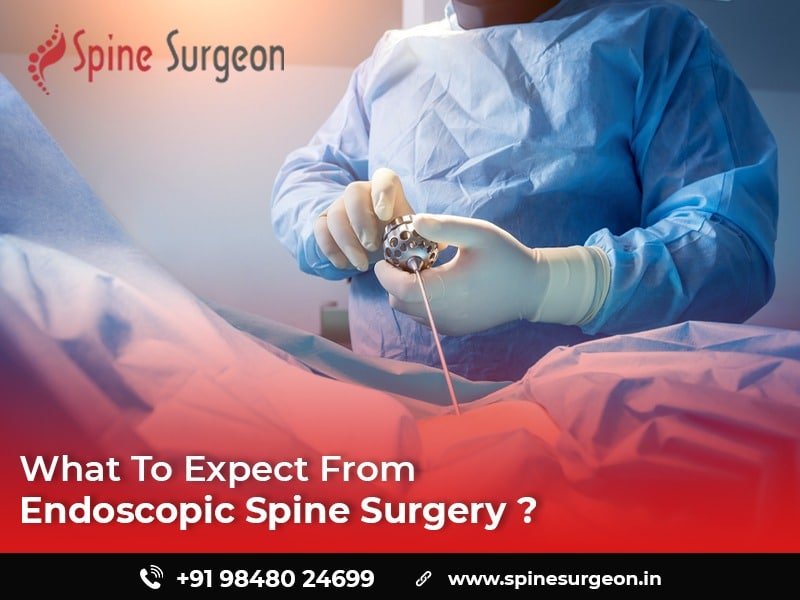If you have any spinal problems that cause pain, numbness, or other neurological problems that can’t be treated with non-surgical treatment, you might be an ideal candidate for endoscopic spinal surgery. Endoscopic spine surgery (ESS) is a minimally invasive surgery (MIS) that helps to relieve chronic back pain and other symptoms related to spinal problems.
The main purpose of developing an endoscopic spine surgery was to provide a faster recovery and to prevent recurring pain caused by traditional spine surgery for patients who had undergone EES.
ESS is a surgical procedure that requires small incisions and an endoscope to look into the surgical area. The endoscope is a thin tube like structure that has a small, light headed camera at the tip, which helps the surgeon observe inside the spine and make any necessary repairs.
How is endoscopic spine surgery performed?
The procedure involves making a few small incisions (less than 1 inch) and carefully separating the muscle tissues to make way for an endoscope to be sent into the spine. An endoscope is a thin tube-like structure with a high-resolution camera and a light source at the tip of the tube.
This camera helps to view the inner surgical area on a monitor so that the surgeon can perform surgery with ease.
The projected images help the surgeon identify the region of the problem and insert other instruments through the incisions to fix spine problems, like removing bone spurs and fixing herniated discs or damaged ligaments, etc. Once the procedure is completed, the surgeon removes the instruments and closes the incision with sutures.
What conditions does endoscopic spine surgery treat?
Endoscopic spine surgery is a technique that helps to treat a variety of spinal conditions. While all spinal conditions might not be suitable for endoscopic surgery, it can be effective for the following conditions:
Herniated disc
Endoscopic discectomy is the procedure used to treat herniated discs that usually develop in the cervical, thoracic, and lumbar spines. The procedure involves removing a portion of the herniated disc to relieve pressure.
Synovial cysts
These cysts are fluid-filled sacs that are formed close to the facet joints of the spinal cord and may compress nearby nerves, resulting in pain and various neurological problems. These cysts can be removed with the help of endoscopic surgery.
Spinal stenosis
In this spine condition, adjacent nerves become compressed, causing pain and discomfort. To decompress the spinal canal or nerve roots, an endoscopic laminectomy or endoscopic foraminotomy surgical procedure is performed.
Discogenic back pain
This is a condition caused by damage to intervertebral discs, either due to injury or degeneration. However, it can be treated with endoscopic procedures like discography or annuloplasty.
Facet joint syndrome
This is an inflammatory condition that causes pain in the facet joints of the spine. However, it can be treated with procedures like endoscopic rhizotomy or radiofrequency ablation, which can provide long-lasting relief from pain.
Spinal deformities
Certain spinal deformities, particularly scoliosis or kyphosis, can also be treated with the help of an endoscopic procedure like facet joint fusion or spinal instrumentation.
Vertebral Compression Fractures
These spinal fractures are commonly caused by osteoporosis or trauma. These vertebral fractures can be stabilised with the help of vertebroplasty or kyphoplasty, which involves injecting bone cement into the fractured vertebra by endoscopic surgery.
Arthritic problems, radiculopathy, sciatica, etc. are some other spine problems that can be treated with endoscopic surgery.
What are the advantages of endoscopic spine surgery?
As endoscopic spine surgery is an invasive procedure, it has more advantages compared to traditional spine surgeries. A patient who undergoes endoscopic spine surgery can have the following benefits:
- Minimal muscle trauma because of smaller incisions
- Less blood loss
- Faster recovery
- Low levels of scarring
- Less post-operative pain
- Less risk of infection
The best part of endoscopic spine surgery is a shorter hospital stay and quicker recovery. The success rate of endoscopic surgery is also high. However, it might not be suitable for spinal problems like cancer, scoliosis, spinal instability, or trauma.
The fact is that endoscopic spine surgery is a special procedure that only a few neurosurgeons have the skill to perform. Therefore, it is important to choose a spine specialist who has a proven track record of performing endoscopic spine surgery in case you need and are eligible for a surgical procedure. For diagnosis and treatment of any spine problem, consult Dr. Surya Prakash, one of the best spine surgeons in Hyderabad. He has more than two decades of experience as a spine specialist in Hyderabad. Call +91 9848024699 to book your appointment.








